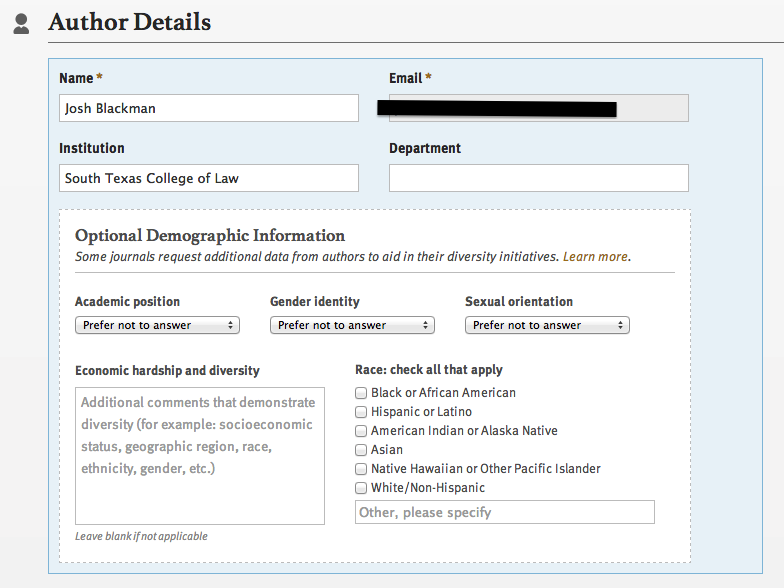With Scholastica, there is a new player in the journal submission process. ExpressO no longer has a monopoly. As I noted in a previous post, it seems that ExpressO is modifying their program to compete with this new entrant (including making it free for journals, which is a very good thing.
I haven’t submitted through Scholastica yet, but I did sign up for an account, and discovered one interesting feature.
The submission page asks for the Author’s demographic information, including an author’s gender identity, sexual orientation, race, and a box to explain “economic hardship and diversity” (it suggests “Additional comments that demonstrate diversity (for example; socioeconomic, status, geographic region, race, ethnicity, gender, etc.”)
While it is usually optional, Scholastica notes that “Some journals request additional data from authors to aid in their diversity initiatives.”
Some journals hosted on Scholastica request optional demographic information (e.g. race, gender, sexual orientation, etc.) from authors when they submit a manuscript. Optional demographic data collected in the manuscript submission form will be made available to journal editors only, and optional demographic data will be stored with the manuscript submitted to that journal. Journals which do not request optional demographic information at the time of submission will not have access to this data. Authors are not required to submit optional demographic information in order to submit a manuscript to a journal on Scholastica. The choice to request this data is made explicitly by the journal, and use of the data is entirely the responsibility of the journal collecting the data. Scholastica will store the data on the journal’s behalf and allow journals to collect and analyze data, but Scholastica will not sell, trade, or transfer an individual’s personal information to any third party or entity.
Journals who ask authors to submit demographic information:
California Law Review
UC Davis Law Review
Boston College Law Review
In order to submit to the California Law Review, UC Davis Law Review, and Boston College Law Review (I suspect this list will grow as journals are added to Scholastica), an author is asked (not sure whether this means its mandatory) to list race, gender identity, and sexual orientation. I don’t know if journals in other fields ask for this information (I think most peer-reviewed journals review articles blind), but I have not seen this from Law Reviews before
So what to make of this request for information? To my knowledge, the journals have not stated why data about race, sexual orientation, and gender identity will be used, nor have they specified how this information will be considered. I suppose it is possible that they are simply collecting this information so they know who is submitting articles.
Though I am quite curious if, and how this information is being used during the selection process.
I’ll try to find out more.
